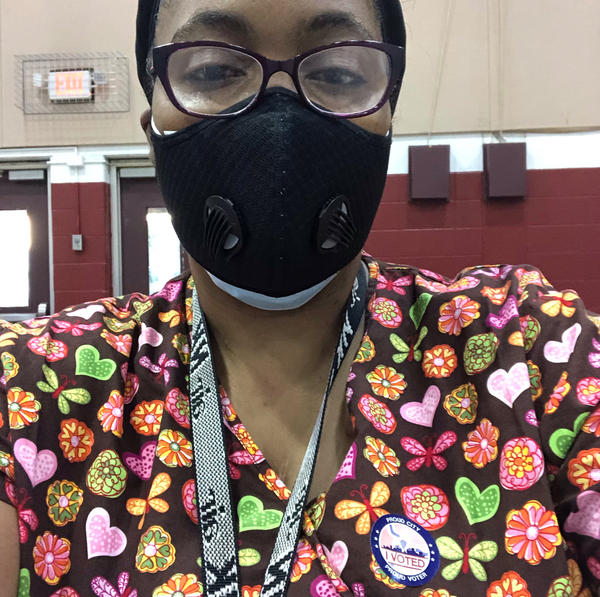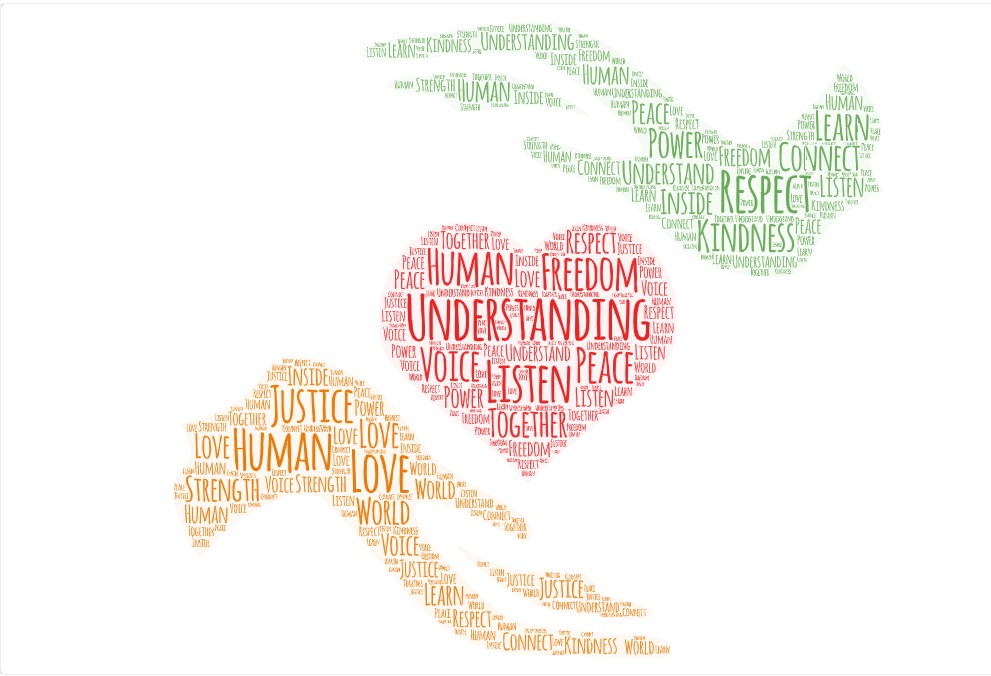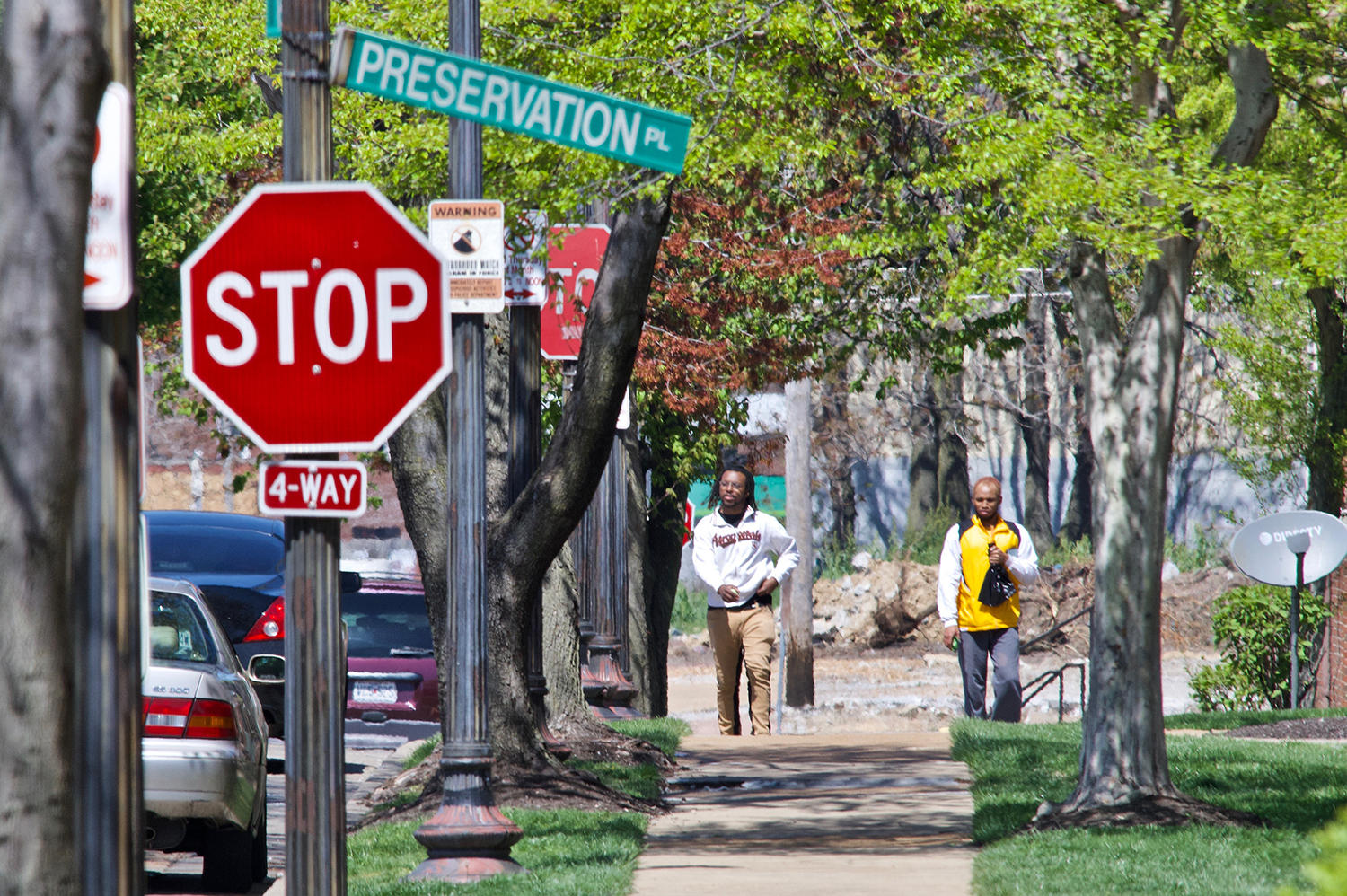
This story was produced in partnership with the Pulitzer Center. Additional support was provided by the Buckingham Strategic Wealth Pillar Grant Program.
Kim Daniel has vivid memories from the day she accompanied her mother to the polls in November 1976. It seemed like such a big deal and a big decision for Kim's mother to make. The 10-year-old Kim could hardly decide whether to root for the peanut farmer or the guy who pardoned the president mixed up in this thing called Watergate. Kim surmised Watergate had something to do with the park across from her school with a couple of ponds and a stately home nearby with who knows what going on inside.
After that election, which the peanut farmer won, her interest in politics waxed and waned. But this year Daniel, now 54, is hell-bent on making it to her polling place — Ward 5, Precinct 5 — at Jefferson School. She knows going there on Nov. 3 will put her at risk. She has a congenital heart defect that has taken her to death's door several times over the course of her life and kept her isolated nearly every day during the pandemic.
"I only go out the first of the month to pay rent," Daniel says. "Then, around the 16th, I pick up my prescriptions and a few grocery items. I try to never be in that mask for more than 30 minutes at a time. It bothers my breathing."
Daniel lives in Preservation Square, a neighborhood a mile west of downtown. It is part of ZIP code 63106, identified by the authors of the 2014 For the Sake of All report as the region's most problematic when it comes to the social determinants of health. The researchers' number-crunching showed that the average life expectancy of someone born in 63106 in 2010 would be 67 years, compared to 85 for an infant in 63105, which encompasses mostly white and wealthy Clayton, the St. Louis County seat.
Daniel, who is an avid consumer of news and is engaged in her community's civic life, is well aware of the disparities. These are among the issues that are driving her to cast her vote. Daniel also knows she could have requested an absentee ballot from the city's Board of Election Commissioners. And the process has been made pretty simple. She qualifies for a ballot that does not require her to go to the trouble of having it notarized. The Board of Elections has created exceptions for older adults and those in an at-risk category for contracting COVID-19.
But Daniel very much wants to go to the trouble of voting in person. It provides a measure of satisfaction and psychological assurance that her ballot will be counted.
It will also bring back sweet memories of when her mother took her to the polls with that same sense of purpose.
She recently wrote a recollection of that day on her blog.
"The first time I ever considered the concept of voting, it was November 1976. HELP INC. was our polling place, and the lines were stretched out the door and down the block to the FINA gas station, at least a quarter-mile back. Cars were double-parked on both sides of the road, and Momma parked two blocks away, leaving us to hastily march back to HELP INC., to stand in the ever expanding line.
"I was 10. Jimmy Carter was running for president, against Gerald Ford, and the cost of unleaded gasoline was 54 cents, according to the sign that hung over my head.
"In the days leading up to the election, I overheard grown folks in the Black community talking about Jimmy Carter, the Peanut Man. While in the white community, where my siblings and I attended a predominately white, private Christian school, Gerald Ford and Watergate was the topic of conversation. In my naïveté, I thought Watergate had something to do with the black iron gates, surrounding the park across the street from the school, and the two ponds within the park. I thought the luxury home on Park Avenue with the wrought-iron balcony, facing Lafayette Park, was the Watergate headquarters, and someone was there planning government deceptions.
"That night, Momma arrived home from work about 5:30 p.m., she rushed us into the car, turned three blocks, parked at the edge of the alley, and hastily marched us into line. Polls closed at 7 p.m., and Momma wanted her vote to count. With my new digital wristwatch, gifted to me in September for my birthday, I kept track of time. When Momma stepped into the voting booth, my wristwatch read 6:27 p.m. Leaving the polling place, we stopped at White Castle, picked up dinner, and returned home. Flicking on the television, breaking news was on, and they said the Peanut-Farmer had won Missouri. Looking at my wristwatch, the time read 7:23 p.m. My mind pondered, "how could they know?" Momma had just voted, and all those folks were still in line when we left. How could they have closed the polling place, rushed all the ballots to Jefferson City, and have them all counted in under an hour?
"From that moment on, my voting concept was tainted. One, I was rooting for Gerald Ford, he was much better looking than Jimmy Carter. Two, in my mind, there was no way Momma's vote or any of those other folks gathered at HELP INC. was counted in the election, in that short amount of time."
Daniel went on to relate that Jesse Jackson's run for president in 1984 drew her interest. But when he dropped out of the process, so did she. She voted in 1996 for Bill Clinton and then did not vote in another presidential election until Barack Obama sought the presidency in 2008. She voted again for Obama in 2012.
And in 2016? "I voted the Green party and found myself ridiculed and scrutinized harshly via Facebook," she wrote. "The scrutinizer was of the opinion that my failure to vote for Hillary Clinton was an automatic vote for Trump; however, for me, this was farthest from the truth.
"It seemed the only place my vote counts or makes a little bit of difference is in local elections. But I cannot wait for November; I will vote GOODBYE TRUMP!"
But how many get in line behind her? A recent Remington Research poll shows Trump ahead in the race for Missouri's 10 electoral votes, though by a slimmer margin than he won the state in 2016. That could impact down-ballot races, where, for instance, Democrat Nicole Galloway is running against Republican Gov. Mike Parson.
You won't see many yard signs for any candidate in Daniel's neighborhood. Though it's a Democratic stronghold, the level of enthusiasm only goes so far. Turnout for the 2016 election in Daniel's precinct was just short of 55% of registered voters. That compared to a turnout of nearly 70% citywide that year.
That year, voters across 63106 went heavily for Hillary Clinton, giving her a whopping 97% of the vote. The totals were comparable in nearly all of north St. Louis. In fact, according to data analysis provided by the New York Times after the election, you would have had to drive 15 minutes from Preservation Square to find a community where Trump carved out a plurality over Clinton — Granite City, Ill.
Daniel is not all that enamored of Joe Biden, though he looked pretty good to her in that first raucous debate. "All dolled up," is how she put it. Still, she thinks Trump won the argument with the former vice president. In the back-and-forth, Daniel observed that Biden "gave up too quickly. He didn't follow through."
Just the same, Daniel didn't think Trump won over any undecided voters, and certainly not any Black voters.
"Not many in my community believe they can have any kind of reasonable conversation with Donald Trump," she said.
"I vote my health," Daniel added. That comment is applicable on many levels. Daniel voted for Medicaid expansion in Missouri's election in August. Though it will not directly apply to her, she says access to health care for everyone is essential. Then there's the matter of crime.
Preservation Square has long felt unsafe to her. In the spring, Daniels literally dodged a bullet that pierced the wall of her apartment when a nearby tenant's boyfriend fired an automatic weapon. Fortunately, no one was physically hurt. That tenant has since moved elsewhere, but it's not uncommon for Daniel to hear gunshots coming from across the parking lot or down the street.
In 63106 overall, according to an analysis of St. Louis Police crime data, aggravated assaults were up 30% since COVID-19 hit.
In a telephone interview on Oct. 2, Daniel provided her personal experience: "There was a shooting yesterday afternoon during the time I was tutoring. (Daniel is a volunteer for yourwordsstl.org, a nonprofit supporting literacy efforts aimed at disadvantaged youths.) And there was a shooting last night and a shooting at 4:30 this morning. Last night it had to be very serious. You could hear several police cars and several ambulances. People ran out afterward to see what happened. But I didn't stay up to try to figure it all out. It's the same old, same old."
While Daniel is in Biden's camp this November, Democrats can't necessarily count on her for a down-ballot vote (she remains undecided about the governor's race) or even for the next presidential contest.
Says Daniel: "I don't want to be that person others can figure out."
Crime data analysis provided by Janelle O'Dea.
More of Kim Daniel's observations are on her blog: https://sistasistasister.wordpress.com/
This is the third chapter in the story of Kim Daniel, who is coping with the pandemic in a neighborhood plagued by chronic illness and much shorter life spans than those in predominantly white neighborhoods. Daniel, 54, has lived with a congenital heart defect that has taken her to death's door several times over the course of her life.
Before Ferguson Beyond Ferguson, a nonprofit racial equity project, is telling the story of families in 63106 one by one over the course of the pandemic. St. Louis Public Radio published the first chapter in Daniel's life on April 28; and the second chapter on July 10; this is the next installment. You can find an archive of other family stories at https://beforefergusonbeyondferguson.org/63106-project/
COVID-19 Update: The connection between local and global issues–the Pulitzer Center's long standing mantra–has, sadly, never been more evident. We are uniquely positioned to serve the journalists, news media organizations, schools, and universities we partner with by continuing to advance our core mission: enabling great journalism and education about underreported and systemic issues that resonate now–and continue to have relevance in times ahead. We believe that this is a moment for decisive action. Learn more about the steps we are taking.

Education Resource
Exploring Personal Connections to Racial Justice through Social Emotional Learning
This unit was created by Tracy Crowley, an Information and Media Literacy Specialist at Jack London...















